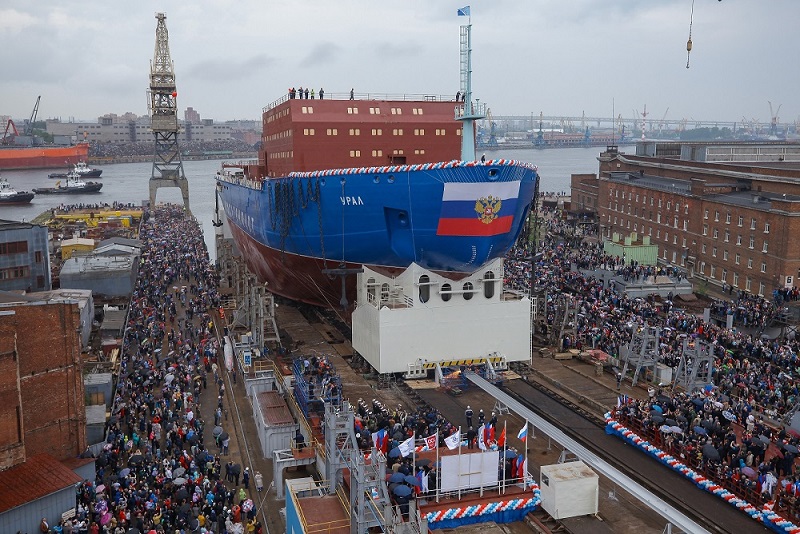 The launch of the nuclear-powered icebreaker Ural in May 2019. Credit: Rosatom
The launch of the nuclear-powered icebreaker Ural in May 2019. Credit: Rosatom
Russian state nuclear company Rosatom is prepared to launch the world’s first floating nuclear plant in the Arctic Ocean, which it describes as being ‘based on the application of advanced nuclear technology.’
Rosatom’s fleet includes two nuclear icebreakers with twin-reactor nuclear power plants and two with a single reactor, the most notable of these being the Akademik Lomonosov. The fleet, which is known as Rosatomflot had previously worked on navigating through the northern sea route (NSR) and transporting hydrocarbon.
However, it will now travel to the Arctic port of Pevek to provide energy for the Chukotka region and support mining and drilling operations in the area. Each reactor has a capacity of 70MW, which Rosatom states will be able to power 100,000 homes in the region. The company has also described the ship as “virtually unsinkable” as it is able to withstand icebergs and waves of up to seven metres.
Rosatom has also said the ship will allow for the retirement of a coal-burning power station and a nuclear plant, but fears have been raised about the project.
Greenpeace Russia has described the ships as a “nuclear Titanic” and a “Chernobyl on ice,” whilst neighbouring Norway has previously raised concerns about the project, successfully lobbying the Russian government in July 2017 to ensure that the ships will travel past Norway without having nuclear fuel on board.
Arctic environmental group The Bellona Foundation also warned of the possibility of a tsunami detaching the ship from its water source onshore and causing a significant nuclear accident.
Responding to criticism, Vladimir Irminku, one of the chief engineers on the Akademik Lomonosov ship said: “This and a ‘Chernobyl on ice’ is just night and day, we’re talking about totally different systems. There should always be scepticism but they’re going overboard. If they say there is a possibility of an accident with the reactor then they have to present evidence.”
In response to Bellona’s criticisms, platform deputy head of construction Dmitry Alekseyenko added: “We studied the experience of Fukushima closely. According to our tests, a tsunami caused by a nine-point earthquake will not dislocate it from its base.”
If successful, Rosatom hopes to sell floating nuclear plants to other countries, having had initial discussions with Sudan.